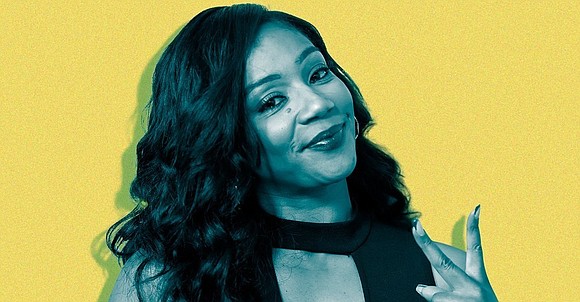FEATURE: ‘Girls Trip’ Star Tiffany Haddish’s Remarkable Rise
Style Magazine Newswire | 10/16/2017, 9:02 a.m.
Source: Good Black News
by Michael P. Jeffries via theatlantic.com
When comedian Tiffany Haddish was 9, her stepfather tampered with the brakes on her mother’s car, hoping to kill his partner and her four children. Rather than going out with her mom that day, Haddish asked to stay home and look after her younger siblings—sparing her from the horrific accident that left her mother mentally impaired. As the oldest child, Haddish did what she could to help for three years, from tying her mother’s shoes to paying bills, but eventually Haddish and her siblings were placed in foster care.
Haddish used the trauma and tragedy of her upbringing to ignite what is now a blazing comedy career. As a child, the Girls Trip star was teased for being a foster kid, but Haddish has also talked about maintaining a strong sense of self worth in her recent Showtime standup special, She Ready!: From the Hood to Hollywood. “The state of California paid so much money to make sure I don’t die ‘cause they knew I was gonna be special,” Haddish tells her audience. “They knew it. They was like, ‘This one right here, she gonna be a unicorn.’ And they was right. I’m the last black unicorn, bitch!”
Haddish’s ascent in recent years—debuting on NBC’s The Carmichael Show in 2015 and appearing in the 2016 action comedy Keanu and the summer hit Girls Trip—is a testament to her talent and resilience. But her story also offers insight into what it takes for a black woman in comedy to become successful today. Haddish’s rise points to where systemic roadblocks still lie for performers of color, particularly women, when they first enter the business—and how some barriers to entry may be falling as comedy enters a new golden age, with fewer gatekeepers and more platforms for artists to reach their fans.
Even though Girls Trip has a black director and writers, Haddish faced questions about her low profile. Her agent initially told her that studio executives were looking for someone with a bigger name to play her character, Dina. Haddish told her agent to tell them, “I’ve had a name since 1979. Okay? I was born with a name.” In the end, her rare comedic gifts won out, and reviews of Girls Trip regularly singled Haddish out for praise.
Read the full story Good Black News









